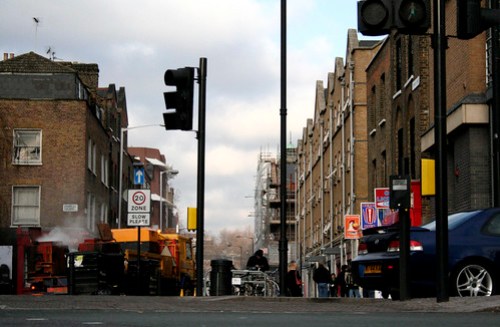
I’ve been reading The Death and Life of Great American Cities at a leisurely pace since october or so. (A tempo that seems to suit the book fine. Jacobs makes me want to slow down and see.) I came across this passage during a session with the book this weekend and something about a recent visit to London clicked.
After explaining how large companies do not need to be in cities because they are to a large extent self-sufficient and thus do not have to rely on services outside themselves, Jacobs goes on to say:
“But for small manufacturers, everything is reversed. Typically they must draw on many and varied supplies and skills outside themselves, they must serve a narrow market at the point where a market exists, and they must be sensitive to quick changes in this market. Without cities, they would simply not exist. Dependent on a huge diversity of other city enterprises, they can add further to that diversity. This last is a most important point to remember. City diversity itself permits and stimulates more diversity.”
(My emphasis, by the way.)
The day before Playful ’09 I spent some time at BERG, Tinker.it! and Really Interesting Group. Nothing fancy mind you. I mean, they lent me a chair and a bit of table, plus internet. It wasn’t like I actually worked with them (although I’m sure I would enjoy it!) It was a nice experience, but most of all, it was humbling. I was struck by the spareness of the space they were in, the limited facilities at their disposal, the little room they had for all the people present.
Let me just say it was as little or less than what I’ve seen comparable groups in the Netherlands have to make do with.
And this is the thing. Over here, many of the startups I’ve encountered seem to believe they first need more and fancier facilities before they can make it big time. The Silicon Roundabout crew I mentioned earlier make a global splash at a regular basis, despite the limited (that I observed) resources at their disposal.
However, and this is where the quote from Death and Life comes in, perhaps I was looking at it the wrong way. Perhaps the Shoreditch startups are more effective than their Dutch counterparts not just because they do more with less (and because they are, clearly, insanely talented and hard working, “riding the wave of innovation, 24/7”, right guys?) but because they are in London. A city at a different scale than Amsterdam or for that matter the greater Amsterdam area, the Randstad as we call it around these parts. A city with a more diverse ecosystem of services and things, smaller services, more specialised services, ready to be employed by companies like BERG and RIG and Tinker, enhancing their abilities when needed.
The city, in this case, not as a battle suit, but more like a huge drug store stocked with a huge range of pharmaceuticals that augment then this trait, then the other.

